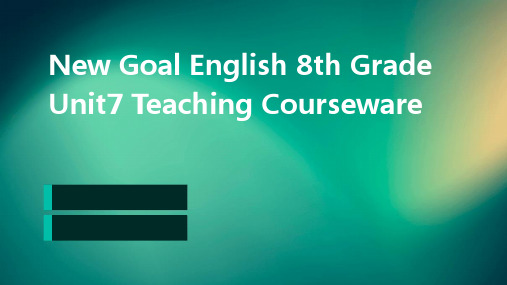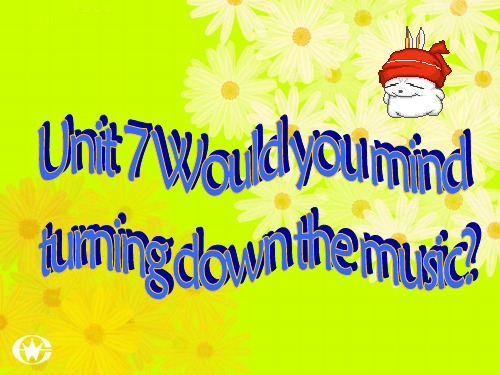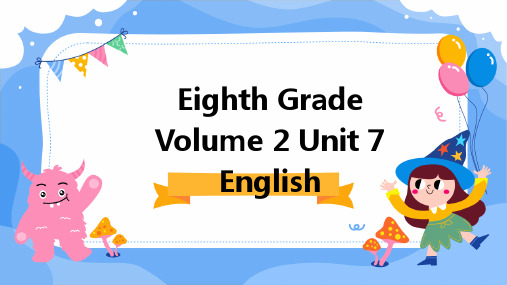初二下册英语unit7课件
新目标英语八年级下unit7教学课件

Vocabulary application
summary
Vocabulary application refers to the process of using learned vocabulary in real-life contexts and in different situations.
Learners should be familiar with the procedures and safety measures involved in a lifeboat drill.
Learners should be able to follow instructions and respond quickly and appropriately in an emergency situation.
提供多样化的阅读材料,包括故事、科普文章、 新闻报道等,以满足不同学生的阅读需求。
3
适当难度调整
根据学生的实际水平,对阅读材料进行适当的难 度调整,确保学生在阅读中能够获得成就感。
reading skill
阅读策略指导
教授学生阅读策略,如预测、推 断、总结等,帮助学生更好地理
解文章内容。
词汇积累
引导学生通过上下文理解生词, 积累词汇量,提高阅读速度和理
精神。
学习策略目标
学生能够掌握有效的学 习方法和策略,提高自 主学习和合作学习能力。
Course outline
Unit Theme
本单元的主题是“Festivals and Celebrations”,旨在让学生了 解不同国家和地区的节日庆祝习
俗和文化传统。
Lesson 1
本课主要介绍世界各地的节日类型 和庆祝方式,通过阅读和听力练习 让学生了解不同节日的文化背景和 意义。
人教版八年级英语下册unit 7单元优质课件

Words and expressions
tourist wall amazing
ancient protect wide as far as I know
n. 旅行者;观光者 n. 墙 adj. 令人大为惊奇的; 令人惊喜的
adj. 古代的;古老的 v. 保护;防护 adj. 宽的;宽阔的 就我所知
这种鱼都是自家做的。
This kind of fish is homemade.
3. Feel free to ask me anything on today’s Great
Wall tour. 在今天的长城游中,大家尽管问我任何问题,不 要拘束。 feel free是英语口语中一个常用表达。若有人让 你feel free to do something,就是让你无需拘束, 只管按照自己的意愿去做某事。e.g.
The Sahara
➢ Objectives
square, meter,
deep, desert, population, Asia, tour,
tourist, wall, ancient, protect, wide…
Words and expressions
square meter deep desert population Asia feel free tour
这个城市的人口是600万。 The population of this city is six million. 中国的人口比美国的人口多很多。
The population of China is much larger than that of the USA.
2. man-made 为合成形容词,意为“人造的”。英语中像这样 与-made复合而成的形容词还有:handmade(手工 制作的)、homemade (家庭制作的)、machinemade (机制的)等,用以描述产品的生产或制造手 段、特点等。
八年级英语下册unit7课件

3. 序数词修饰最高级 Mike is the second tallest student in our class. 4.one of形+容词最高级+名词复数表示“最… 之一”
最高级 best worst least most farthest /furthest oldest /eldest
形容词与副词的原级
1.无比较对象时用。
I am tall. He is hungry.
2.原级前的修饰词。
very quite so too pretty. 3.肯定 as+原级+as
5. “the+比较级 , the + 比较级”表示“ 越…, 越 …” The more you exercise, the healthier you will be.
6. 表示不及另一方时,用“less+原级+than…” (双音节和多音节词)
He is healthier than she.
以辅音字母加 y 结尾双音节 词变 y 为 i 加 –er 或 –est
重读闭音节、末尾只有一个 辅音字母双写加 –er 或 –est
少数以er,ow 结尾的双音节 词加-er -est
eafralyt, hot, red, earlier t–heina,rlwieestt, sad bigcqagureiercbf-kuibgllyi,,gsgnlyeoaeswrtlrllooypww,ou,psuelfaurl,,
She is less healthy than he.
八年级英语下册Unit7课件

B: OK, I’ll get up right away. Do I have to
_w_a_s_h__d_i_s_h_e?s A: Yes, and you __h_a_v_e__to_ help me make dinner. B: OK, when I finish,c_o_u_l_d__y_o_uhelp me with my
Sorry. I’ll stop it right away.
Would you mind not smoking here?
Please don’t smoke here. You shouldn’t smoke here. You mustn’t smoke here. You’d better not smoke here. Could/Can you please not smoke here? Would you please not smoke here?
--Would you mind not playing the computer games?ቤተ መጻሕፍቲ ባይዱ
--I’m sorry. I’ll stop it right away.
--Would you mind getting up early? --Not at all. I’ll do it right away.
Would you mind opening the door? Do you mind opening the door? --- No, not at all./ I’m sorry.
区分 Would you mind opening the window? 你介意开窗吗? Would you mind my opening the window? 你介意我开窗吗?
八年级下册第七单元英语ppt

Learning gains from this unit
Critical thinking
Developed the ability to analyze and evaluate different perspectives in texts
Gained experience in making informed decisions based on evidence and reasoning
The author corporations many cultural references and allocations, such as the Victorian era, the works
of other authors, and traditional fairy tales
Understanding the cultural background of the story helpers readers better understand the characters, events, and themes in
1
Writing skills
2
Could further develop essay writing skills by practicing more timed writing assignments
3
Could improve grammar and punctation skills through additional practice and feedback
Listen to a paragraph and fill in the blanks with missing information
八下英语7单元ppt课件ppt课件ppt课件

Provide a passage with multiple choice questions or true/false statements to test students' comprehension.
Recommendations include listening to English podcasts, watching English movies/TV shows with English subtitles, and speaking with native English speakers.
Reading Comprehension Passages:
Paragraph Writing:
Provide a topic and ask students to write a paragraph in their own words, incorporating the given vocabulary and grammar structures.
Unit Overview
The unit theme is "Exploring the World of English Language and Culture". It aims to introduce students to the richness and diversity of the English language and the cultures it reflects.
Practice and consolidation
在此添加您的文本17字
人教版八年级英语下册教学课件《Unit-7-Section-B-1a-1d》
➢ 中考链接 U7S-
— What subject do you like ____, English, math
or physics?
— Of course, English.
1b
Listen and check (✓) the numbers you hear.
__✓___100
_____ 50
__✓___ 0.2
_____ 16
_____ 120
__✓___ 150
__✓___ 20 __✓___ 0.1
1c Listen again and complete the
this panda.
(200 cm taller/shorter, weigh much more/less, eat much more/less, eat many times more.)
This panda is 200 cm shorter than this elephant. This elephant eats much more than this panda.
称……的重量
birth
n. 出生;诞生
at birth
出生时
up to
到达(某数量、程度等);
至多有;不多于
adult
adj. 成年的;成人的
n. 成人;成年动物
Elephant
-is 350 cm tall -weighs 5,000 kilos -eats 150 kilos of food a day
more than a baby panda.
八年级英语下册unit7课件(一)
八年级英语下册unit7课件(一)Unit 7: The WeatherTeaching Content•Vocabulary related to weather•Sentence structures for describing weather•Listening and speaking activities related to weather •Reading and writing activities related to weather Teaching Preparation•Prepare flashcards or visual aids for weather vocabulary •Prepare listening materials or videos related to weather •Prepare reading materials or texts related to weather •Prepare writing activities or prompts related to weather Teaching Objectives1.To introduce and practice weather vocabulary2.To provide opportunities for students to practicedescribing weather using appropriate sentence structures3.To improve students’ listening and speaking skillsthrough weather-related activities4.To enhance students’ reading comprehension skillsthrough weather-related texts5.To develop students’ writing skills by engaging them inweather-related writing tasksDesign ExplanationThe design of this lesson aims to engage students in various activities related to weather, allowing them to actively practice and consolidate their understanding of the vocabulary and sentence structures. The lesson includes a combination of listening, speaking, reading, and writing activities to cater to different learning preferences and skills.Teaching Process1.Warm-up activity:–Show pictures of different weather conditions and ask students to describe them using the appropriatevocabulary.–Play a short video or audio clip of different weather conditions and ask students to identifythem.2.Vocabulary introduction and practice:–Present weather vocabulary using flashcards or visual aids.–Drill the pronunciation and spelling of the weather words.–Engage students in various vocabulary practice activities such as matching, fill in the blanks, orword association games.3.Sentence structure practice:–Introduce sentence structures for describingweather (e.g., “It’s sunny today,” “It’sraining heavily”).–Provide examples and model the sentence structures.–Ask students to practice forming sentences to describe different weather conditions.4.Listening and speaking activities:–Play a weather-related listening activity or video.–Ask comprehension questions to check understanding.–Engage students in speaking activities such as pair or group discussions about their favorite weatheror their experiences in different weatherconditions.5.Reading activity:–Provide students with a short passage or text about different weather conditions.–Ask students to read the text and answercomprehension questions.–Discuss the main points and key details in the text.6.Writing activity:–Assign a writing task related to weather, such as writing a weather forecast or describing amemorable weather experience.–Provide prompts or guiding questions to helpstudents structure their writing.–Collect and review students’ written work,providing feedback and suggestions for improvement.Post-lesson ReflectionThis lesson successfully engaged students in various interactive activities related to weather. The use of visual aids, listening materials, reading texts, and writing tasks provided students with different opportunities to practice and apply their understanding of weather vocabulary and sentence structures. The lesson could be further improved by incorporating more group activities and opportunities for student interaction. Additionally, providing students with real-life weather scenarios or dialogues could make the lesson more practical and relatable.Unit 7: The Weather (Continued)Teaching Content•Vocabulary related to weather•Sentence structures for describing weather•Listening and speaking activities related to weather •Reading and writing activities related to weather Teaching Preparation•Review flashcards or visual aids for weather vocabulary•Prepare additional listening materials or videos related to weather•Find more reading materials or texts related to weather •Prepare more writing activities or prompts related to weatherTeaching Objectives1.To reinforce weather vocabulary and sentence structures2.To provide extended opportunities for students topractice describing weather in speaking and writingactivities3.To further improve students’ listening and speakingskills through weather-related activities4.To deepen students’ reading comprehension skillsthrough additional weather-related texts5.To expand students’ writing skills by engaging them inmore challenging weather-related writing tasksDesign ExplanationContinuing from the previous lesson, this lesson builds upon the students’ existing knowledge of weather vocabulary and sentence structures. The focus of this lesson is toprovide additional practice and extension activities to further develop their proficiency in describing weather. The lesson includes more listening, speaking, reading, and writing activities to reinforce their understanding and skills.Teaching Process1.Warm-up activity:–Review the weather vocabulary by playing aflashcard game or a quick vocabulary quiz.–Ask students to describe the weather conditions outside the classroom at that moment.2.Vocabulary and sentence structure reinforcement:–Review the sentence structures for describing weather.–Provide additional examples and ask students to create their own sentences using different weathervocabulary.3.Listening and speaking activities:–Play a weather-related dialogue or conversation.–Ask comprehension questions and engage students in discussions about the dialogue.–Arrange pair or group activities where students role-play different weather scenarios.4.Reading activity:–Provide students with an extended reading passage about weather phenomena or climate change.–Ask students to read the text and answer more in-depth comprehension questions.–Encourage students to share and discuss their opinions on the topic.5.Writing activity:–Assign a more advanced writing task related to weather, such as writing a persuasive essay on theimpact of weather on daily life.–Provide prompts and encourage students to conduct research or gather information to support theirarguments.–Provide feedback on students’ writing and guide them in improving their critical thinking andpersuasive writing skills.Post-lesson ReflectionBuilding upon the previous lesson, this lesson successfully reinforced students’ understanding of weather vocabulary and sentence structures. The additional listening, speaking, reading, and writing activities provided opportunities for students to apply these language skills in various contexts. Students were able to engage in more in-depth discussions and express their opinions on weather-related topics. To further enhance the lesson in the future, incorporating real-life weather data, multimedia resources, or interactive online platforms relating to weather could make the learning experience more dynamic and captivating.。
人教版八年级英语下册教学课件-Unit 7-Section A (3a-3c)
1. One of the world’s most dangerous sports is mountain climbing, …
“one of + the + 形容词的最高级 + 复数名词”,意为“最……之一”。 Miss Wang is one of the most popular teachers in our school. 王老师是我们学校最受欢迎的老师之一。
One of the most popular places to go for mountain climbing is the Himalayas.
在喜马拉雅山脉之中,海拔在7000米以上的高峰有50 多座,8000米以上的有16座,著名的有南峰、希夏邦马 峰、干城章嘉峰。“喜马拉雅”在藏语中就是“冰雪之 乡”的意思。这里终年冰雪覆盖,一座座冰峰如倚天的 宝剑,一条条冰川像蜿蜒的银蛇。其中最为高耸的则是 位于中国和尼泊尔边界上的珠穆朗玛峰,它以高达 8844.43米的高度,是世界最高峰。
1). 浓的,浓厚的;粘稠的;混浊的 It is dangerous to drive in a thick fog. 在浓雾天驾车很危险。
2). 厚的;粗的 How thick is the board? 这块木板有多厚?
4. Even more serious difficulties include freezing weather conditions and heavy storms.
the most dangerous, the most popular places, the highest and the most famous, more serious, stronger
人教版八年级下册第七单元英语课件
c
a
b
e
2b Listening
Sarah, would you mind doing the dishes?
Ok. I’ll do them in a minute.
Nick, would you mind not wearing those old jeans?
OK. I’ll put on another pair.
02
03
添加标题
Would/Could you please open the window?
单击此处添加小标题
Make a student clean the desk.
单击此处添加小标题
Would/do you mind cleaning the desk?
单击此处添加小标题
Would/could you please clean the desk?
No, not at all.
a
b
c
d
2
4
3
1
Would you mind…的用法及其答语: would与mind在口语中连用,表示很客气、委婉地向别人提出请求、建议等.mind后接动名词形式.例如 Would you mind opening the window? 2如果同意表示不介意时,可用如下用语来表达 No, not at all.\Of course not .\Certainly not.不,我不介意\No problem.\Sorry, I’ll do it right away。抱歉,我立刻就做。
当委婉的请求对方做某事或者不要做某事时可以这样问
你可以做某事吗?
1. Could you please do sth?
- 1、下载文档前请自行甄别文档内容的完整性,平台不提供额外的编辑、内容补充、找答案等附加服务。
- 2、"仅部分预览"的文档,不可在线预览部分如存在完整性等问题,可反馈申请退款(可完整预览的文档不适用该条件!)。
- 3、如文档侵犯您的权益,请联系客服反馈,我们会尽快为您处理(人工客服工作时间:9:00-18:30)。
Would you mind turning down the music?请您/您介意把音乐声关小些吗?Would you mind doing sth.•表示礼貌的请求得到许可的用语。
“请你做…你是否介意?”、“请你做…...好吗?”,是一种比较客气的表达方式。
eg. Would you mind opening thewindow?你介意打开窗户吗?•如果要表示“请你不要做…你是否介意?”、“请你不要做…好吗?”,只需在doing 前面加not。
eg. Would you mind not sitting infront of me?请你不要坐在我前面好吗?•Would you mind (not) doing…•Could you ( please ) …•Will you …do…•Would you …A: Would you mind doing the dishes? B: No, not at all.不,一点也不。
应答用语:•如果同意表示不介意时,可用如下用语来表达:Certainly. / Of course not. / Not at all. / No, not at all.A: Would you mind cleaning the floor? B: No, not at all. I’ll do it.A: Would you mind taking out the trash?B: No, not at all. I’ll do it right away.立刻A: Would you mind turning down the music?B: I ’m sorry. I ’ll do it right away.A: Would you mind getting up?B: I’m sorry. I’ll get up in a minute.B: I’m sorry. I’ll do in a minute.1turning off the light 2closing the window3not playing basketball here 4cooking for me56not talking not smoking78not walking on the grass not cutting the lineac b24 354 23b ceaWould you mind…? Would you mind not…?Dear larry ,Your father is at a meeting and I ’m going shopping.I need your help. 1.Would you mind ___washing the dishes _____? 2.Could you please ? 3.Would you mind ? 4.Please .5.Also, you have to .If you finish these tasks , we can go to a movie tonight.love,Mom feed the dog cooking dinner go to the library do your homework情景交际选择A.Would you mind my smoking here?B.Would you mind cleaning your bike now?C.Would you mind waiting in line?D.Would you mind standing straightly?E.Would you mind not talking so long in a telephone?F.Would you mind not talking so loudly?G.Would you mind not smoking here?1. In the library, if someone is talking so loudly, you will say, ______?2.If he is a gentleman, before smoking, he usually asks, __?3.If someone cuts in line, you should say, _______?4.If you don ’t stand well, your teachers or parents will say, _____5.Your mother will say, ______? if you often chat with your friends in a phoneF A C D E1a. Have you ever complained about these things?His barber gave his a terriblehaircut.The store clerk gave her thewrong size.Her friends were late.He said the movie was terrible, but his best friend said it was great.The waitress broughthim the wrong food.The pen he bought didn’t work.——Your barber gave you a terrible haircut.——The store clerk gaveyou the wrong size.——Your friends were late.——The movie was terrible. Your best friend said it was great.——The waitressbrought youthe wrong food.——The pen youbought didn’t work. 1_23PlacesProblems Solution sclothing store ordered a hamburger with French fries, butonly got ahamburger will get a new pengot the wrong size shirt will get a smaller shirt restaurant will get some French friesstore got a pen that doesn ’t workWhat happened to them?When it happens, what would you do?What would you say?3a. Listen to the tape, then try to answer questions below.I can’t stand it!We asked some people what annoyed them. Here’swhat they said:I don’t like waiting in line when a shop assistant has a long telephone conversation. When that happens, I usually say, “Would you mind helping me?”And I don’like it when shop assistants follow me around. Then I say, “Could you please not follow me around? I’ll ask you if need some help.”Usually the shop assistants say they are sorry, but sometimes they get mad. If that happens, I won’t go back to that store again.wait in line排队等候get mad生气(=get angry)I get annoyed when someone talks to me while I’m reading. This happens to me all the time in the school library. When it happens, I usually talk to the person because I want to be polite. But because I’m polite, people don’t know I’m annoyed. So they do the same thing again. Perhaps in the future I should try not tobe polite.annoyed adj. 恼怒的; 生气的polite adj. 有礼貌的; 客气的get annoyed=get angryperhaps adv. 或许; 大概all the time 总是; 一直try to do sth. 尽力去做某事try not to do sth. 尽力不做某事try sth. 尝试某事物try doing sth. 尝试着去做某事I get annoyed when someone stands in the subway door.When this happens, I _______________________________________________________.“Would you mind standing a little inside?”3b. Look at the pictures. Imagine you are the people in the pictures. Complete the sentences.would sayI get annoyed when people cut in line . When this happens, I __________________________________________________________.“Would you mind waiting in a line?”插队n.排;队;列usually sayHow many rules of etiquette are broken?eat in publicsmoke in publicspit everywheretalk loudly in publicSection 2 While You ReadReading strategy:As we read, we need to find “topic sentence”. These sentences usually give us a “summary”, or overall meaning of each paragraph and help us understand what the paragraph is about. After the topic sentence comes more detail and explanation.阅读时需要找到关键句子。
